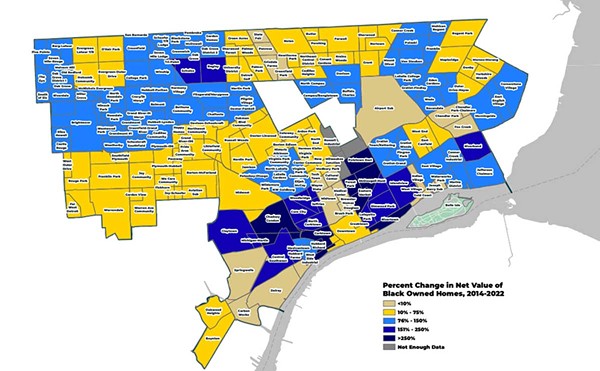It was the summer of love in San Francisco, but in Detroit 1967 it was a summer of rebellion. If you don't know that we are marking the 50th year since that pivotal Motor City moment, then you've probably been avoiding all media the past several months.
We've been rehashing this big-time since last summer, and there will be plenty more rehashing until we get past July. But even then, we will not have gotten past the civil disturbances of 1967. It may take another half-century for that. It has become such a legendary event and issue that we can't even agree on what to call it. I won't get into the "riot or uprising" debate, but I do want to explore why it still looms so large in our thinking.
If 1967 was notable for the amount of death and destruction that took place, then some things need to be put in perspective. The killings of 43 people during the July 23-28 disturbances were irreconcilable tragedies that I don't wish to belittle. When those things happen to families there's never true recovery. But the Detroit homicide total for 1967 was 281 deaths. The total for 1974 reached 714. In 2016, it was 302 — but when you consider that there were about a million more people here in 1967, last year's total looks more horrific.
Regarding the destruction of property, it's harder to parse. Some online sources report some 2,000 buildings burned, but the New York Times, usually a more reliable source, reported in 1997 that 683 buildings in Detroit were damaged or destroyed. Estimates put the economic losses between $40 million and $50 million.
That's a lot, but consider that in 2012 there were reportedly 70,000 abandoned buildings, 31,000 empty houses, and 90,000 vacant lots in Detroit. I can't total the economic losses that befell the city since 1967, but consider that the city declared bankruptcy in 2013 and you get the picture.
When you look at it based on the death and destruction factor, a lot more has happened to Detroiters and their city between then and now. Even in the past 15 years with emergency managers, bankruptcy, the public schools crisis, the mortgage crisis, Kwame Kilpatrick, and more, it's hard for 1967 to rival the more recent maladies.
The events of July 23-28, 1967 took place across the city, but the actual destruction was rather contained. My west side neighborhood wasn't touched. After the rebellion it looked just like it did before the rebellion — a little middle-class neighborhood with well-kept houses and tidy lawns. Go look at that same neighborhood today and literally 50 percent of the housing stock lies in ruins. So much more has happened since then.
Dr. Melba Boyd, distinguished professor of African American studies at Wayne State University, contributed to the upcoming release Detroit 1967: Origins, Impacts, Legacies from Wayne State University Press. "We can't even begin to estimate how much loss there's been to property, whole neighborhoods, the decline of the city's tax base," she says. "You can't even begin to compare 1967 to what has happened in the last 15 years or so."
So why does 1967 loom so largely in our minds? The majority of regional residents weren't even around when it happened. It seems to be the myth of race that we can't seem to get over. The popular legend in the suburbs is that things were just fine in Detroit until 1967 when the black people went crazy and burned the place down. The popular legend in the city is that the police were a racist occupying force and had to be opposed. The legend in the suburbs is that Young told the white people to get out of town. The legend in the city is that racist white folks fled because they couldn't deal with a black mayor... and so on.
It's a convoluted mess that is more mixed up with myth and paranoia than it is with facts and sober thinking. It was about race, but there was a lot more.
"It was not ever all about race," says Boyd. "But race is a critical component to it because the initial confrontation was the consequence of an overwhelmingly white police force, and ongoing police brutality, and oppression of black people. It's also class, obviously because of the setting where we are and, I think, probably more race than class. The initial confrontation was race. When you see the looting that becomes more about class."
There was also the question of who we are and who we want to be. The Vietnam War was still raging. In fact, the incident that started it all was a police raid on a welcome home party for a couple of veterans who'd just got back from Vietnam.
Just a few months earlier, Civil Rights leader Rev. Martin Luther King Jr. said, "We must undergo a radical revolution of values." In that speech he talked about shifting from a thing-oriented society to a person-oriented society. It was part of King's shift, a redefinition of the struggle he had been involved in for the past decade.
Previous to that, King's vision had been to get a piece of the pie for black people. His new approach was to question the quality of the pie itself in opening himself up to the antiwar movement and union organizing. He wanted to fight racism, materialism, and militarism. Unfortunately, he was killed before that new orientation was fully developed.
"We haven't undergone that revolution in values, a realization that you are dealing with human beings here who actually have rights and values, and a lot of people died just so we could get that," says Boyd. "I think we are more materialistic now than we ever were. Militarism in general is an ever looming problem because the current president of this country is all about military might. It's an unfortunate American value that might is right."
And maybe that is a key as to why we are still transfixed on five days in 1967 rather than the bigger issues of why it happened, how we recover, and where we go from here. We like the violence. It's the same reason that, although the crime rate is lower than it's been for decades, crime is still what we see splashed across the media every day.
What happened in Detroit happened across the United States. During the 1960s there were violent rebellions across the land. What happened to Detroit happened to most other big cities when people and money just got up and walked away.
The 1967 rebellion is still a festering sore that has not healed. The same could be said for America. This isn't simply a Detroit problem. But getting over it could be a Detroit solution — if we can have that radical transformation in values.
Like everyone else, I'll pay attention as we drag 1967 over the coals again. But I only value that as a way to light a fire under folks about the issues of today. It's a much bigger struggle today than it was back then.






